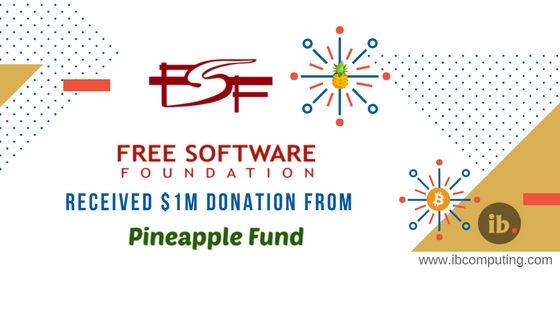Sponsored
A few hours ago the official twitter handle of the Free Software Foundation tweeted that FSF has recieved a whopping donation of $1 Million USD worth Bitcoin (91.45 BTC) from Pineapple Fund.
We’re overjoyed to announce that the FSF has received an extraordinary gift of 91.45 Bitcoin from the #PineappleFund, valued at $1 million! Huge thanks to the Pineapple Fund for this tremendous contribution to software freedom. pic.twitter.com/wOOxZ1HCSA
— Free Software Fndn. (@fsf) January 29, 2018
Sponsored
Contents
Pineapple Fund
Pineapple Fund is a philanthropic project by an anonymous individual to give away 5,057 Bitcoins to charity (valued at ~$86 million as of December 2017). Pineapple Fund has already donated $34,400,000 so far to 41 charities world-wide including Electronic Frontier Foundation ($1 million), Internet Archive Project ($1 million), Software Freedom Conservancy ($250k) and OpenStreetMap ($250k).The Pineapple Fund was announced publicly in December 2017 with a post on reddit.
On a larger scale, the Pineapple Fund created a more mysterious form of cryptocurrency philanthropy.
The organization was started in December by an anonymous donor who goes by the nickname “Pine” and claims to be among the 250 largest holders of Bitcoin in the world. The fund aims to give away $86 million worth of Bitcoin, and has already given $20 million worth of the currency to 13 organizations, including million-dollar donations to the Water Project, which provides clean water to people in sub-Saharan Africa, and the Electronic Frontier Foundation, a digital rights watchdog.
(These donations can be verified thanks to Bitcoin’s digital ledger system, which records every transaction in a public database.)
Whoever Pine is, he or she seems to have found a way to convert Bitcoin into something actually useful.
— New York Times, Dec 27 2017
Free Software Foundation (FSF)
The Free Software Foundation (FSF) is a non-profit, founded by Richard M Stallman (popularly known as RMS), with a world-wide mission to promote the four essential freedoms of computer users.
Freedom 0: The freedom to run the program for any purpose.
Freedom 1: The freedom to study how the program works, and change it to make it do what you wish.
Freedom 2: The freedom to redistribute and make copies so you can help your neighbor.
Freedom 3: The freedom to improve the program, and release your improvements (and modified versions in general) to the public, so that the whole community benefits.
(The numbering begins with zero because “Freedom 0” was not included in the initial list. It is also considered as a pun regarding the common usage of zero-based numbering in programming languages).
Support Free Software Foundation
To supoprt Free Software Foundation please visit https://my.fsf.org/donate.
Your support makes the Free Software Foundation’s work possible. Will you power up the free software movement with a donation today?
We use these funds to help us defend the freedoms and rights of all computer users, nurturing the GNU Project, certifying freedom-respecting electronics, and battling the practice of Digital Restrictions Management.
Sponsored







